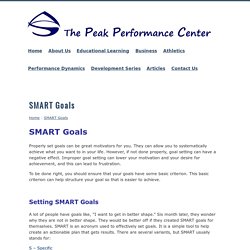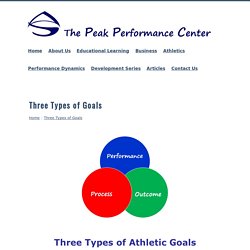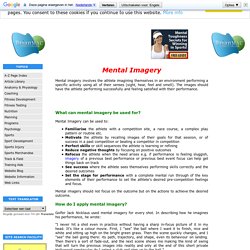

Psychological Skills Training. Introduction Darren Brookfield provides a review of psychological skills training and the factors that can influence the benefits of such a program for an athlete.

Psychological Skills Training (PST) is an individually designed combination of methods selected to attain psychological skill needs (Gill, 2000). There is no single idyllic PST package, each program must be individualised based on the psychological state of the individual and, the sport. To assemble a successful PST program it is important to distinguish between PST skills and PST methods. PST skills are the psychological qualities or attributes that need to be developed (i.e. confidence, concentration), the PST method is the tool that will be used to help improve the PST skill (Calmels et al. 2003).
Psychological skills training and a mindfulness-based intervention to enhance functional athletic performance: design of a randomized controlled trial using ambulatory assessment. Psychological Skills Training Critical To Athlete's Success! Psychological skills training (PST) is as important to the athlete as physical training and can contribute 50-90% of their performance.

Goal setting, self-talk, mental imagery and mental rehearsal, and relaxation are the four most prominent PST methods used by athletes. Like technical or tactical aspects of a sport, they must be learned, developed, and practiced by the athlete. Each athlete has different sporting needs, psychological skill development, orientations and experience, so every PST program must be individualized to fit that athlete. Click To Enlarge.Author Rosie Chee Knows That Psychological Skills Training Is As Important To The Athlete As Physical Training. Psychological Skills Training: The Other Side Of The Coin In The Success Of An Athlete. Psychological Skills Training: Issues and Controversies. How to Develop a Skills Curriculum Social skills programs have proliferated within the last several decades, many of which are based on commonsense notions of what behavior ought to be relevant in a particular social context.

For example, based on commonsense, a program developed for school-aged children might involve protocols for sharing, turn taking, and dealing with conflict. These targets seem reasonable as these behaviors would undoubtedly occur at least several times each day, for most children. However, if one were to ask children or their teachers or parents directly, what behaviors are most relevant in a given social exchange, a different set of targets might emerge.
The above protocols may be deemed irrelevant. Some of the most comprehensive empirically derived social skills programs are those developed by McFall and colleagues (e.g., Freedman et al., 1978; Gaffney & McFall, 1981; Goldsmith & McFall, 1975). 1) Identify patient-relevant problem situations Rule vs. The evaluation of a psychological skills training programme for rugby players. Abstract Evaluation of a psychological skills training programme with a group of nine South African Under-21 provincial rugby players revealed its general effectiveness.

An age-matched quasi-experimental control group design was used. Over a period of four months, rugby players improved in psychological skills and psychological well-being as assessed on standardized measures and as experientially evaluated. Comparisons with a matched control group indicated significant differences between rugby players and control group’s perceptions of improvement in total psychological skills and especially those involving mental preparation, as well as anxiety and worry management.
In terms of psychological wellbeing, the rugby group perceived themselves to have improved significantly more than the control group with regard to personal growth. Five Golden Rules for Successful Goal Setting. Have you thought about what you want to be doing in five years' time? Are you clear about what your main objective at work is at the moment? S.M.A.R.T. goal setting. SMART goals You could say that the whole human endeavour is geared towards setting and achieving goals.

Goals are part of every aspect of life: how you conduct your relationships, what you want to achieve at work, the way you use your spare time... Everything comes down to priorities, and what you would like to accomplish in every aspect – whether you make a conscious choice or go with subconscious preferences. How to set goals. Ideas about Goal-setting. Goal Setting is the Secret to a Compelling Future. Why have goals anyway?

Having goals is the fundamental key to success. Goals let us create our future in advance of it actually happening. Goal setting Brainwaves. SMART Goals - The Peak Performance Center. Properly set goals can be great motivators for you.

They can allow you to systematically achieve what you want to in your life. However, if not done properly, goal setting can have a negative effect. Three Types of Goals - performance, outcome, process. Setting Athletic Performance Goals Goal setting is one of the most important skills you can use to help you achieve optimal performance.

The goal setting process helps you understand your current performance level and then assess what steps you need to take to reach your ultimate performance level. There are three types and levels of athletic goals: Outcome goalsPerformance goalsProcess goals Three Types of Goals Outcome Goals – This type of goal refers to the desired end result. Performance Goals – This type of goal identifies a specific standard to be achieved. Mental Imagery. 1.

Meanings and Connotations of ‘Mental Imagery’ Mental imagery is a familiar aspect of most people's everyday experience (Galton, 1880a,b, 1883; Betts, 1909; Doob, 1972; Marks, 1972, 1999). A few people may insist that they rarely, or even never, consciously experience imagery (Galton, 1880a, 1883; Faw, 1997, 2009; but see Brewer & Schommer-Aikins, 2006), but for the vast majority of us, it is a familiar and commonplace feature of our mental lives. The English language supplies quite a range of idiomatic ways of referring to visual mental imagery: ‘visualizing,’ ‘seeing in the mind's eye,’ ‘having a picture in one's head,’ ‘picturing,’ ‘having/seeing a mental image/picture,’ and so on.
Mental Imagery: Functional Mechanisms and Clinical Applications. Mental Imagery in Sport. Mental imagery involves the athlete imagining themselves in an environment performing a specific activity using all of their senses (sight, hear, feel and smell).

The images should have the athlete performing successfully and feeling satisfied with their performance. Sport Imagery: Athletes' Most Powerful Mental Tool. If you do anything to work on the mental side of your sport, it better be mental imagery. Why, you ask. Because there is no more powerful mental tool than mental imagery and it can have a huge impact on your sports performance. I say this with such conviction because it had that effect on me when I was a young athlete at Burke Mtn. Academy, a private boarding school in Vermont devoted to developing world-class ski racers (it was also the first full-time sports academy in the U.S.)
One summer I took a course at a local college that introduced me to the power of mental imagery. Article continues after advertisement When I studied mental imagery in graduate school, I learned why it is so powerful. In my more than 25 years of work with professional, Olympic, collegiate, and junior-elite athletes, mental imagery is the tool that I emphasize the most with them and the one that I have seen have the greatest impact on their performances. Association for Applied Sport Psychology: Sport Imagery Training. Mental Imagery in Sport. Psychological Imagery in Sport and Performance - Oxford Research Encyclopedia of Psychology. Abma, C. L., Fry, M. D., Li, Y., & Relyea, G. (2002). Differences in imagery content and imagery ability between high and low confident track and field athletes. Journal of Applied Sport Psychology, 14, 67–75.Find this resource: 1396. Relaxation techniques. Relaxation Techniques: Using the Relaxation Response to Relieve Stress.
To effectively combat stress, you need to activate your body’s natural relaxation response. Techniques such as deep breathing, visualization, meditation, and yoga can help. Finding the best relaxation technique for you For many of us, relaxation means flopping on the couch and zoning out in front of the TV at the end of a stressful day. But this does little to reduce the damaging effects of stress. Relaxation techniques: Try these steps to reduce stress. Relaxation exercises. The first step to learning to relax is to understand what happens to you when you are stressed. Do your muscles get tense? Do you feel cranky? Relaxation and Recovery in Sport and Performance - Oxford Research Encyclopedia of Psychology. Van Amelsvoort, L. G. P. M., Kant, I. Self-Talk in Sport and Performance - Oxford Research Encyclopedia of Psychology. Andersen, M.
B. (2009). Positive thinking: Reduce stress by eliminating negative self-talk. Positive thinking: Stop negative self-talk to reduce stress Positive thinking helps with stress management and can even improve your health. Practice overcoming negative self-talk with examples provided. By Mayo Clinic Staff. Thought Stopping: Negative Self Talk Worksheet. Positive self talk can help you win the race. Source: Photo by: Stock.xchng. Thought Stopping and How It Works. Tennis Self-Talk: Historical Examples and Solutions - I. Introduction It’s been said that the mind is always with you or against you…Self-talk in us humans is instinctive, spontaneous and eternal.
And perhaps so is our need for it.